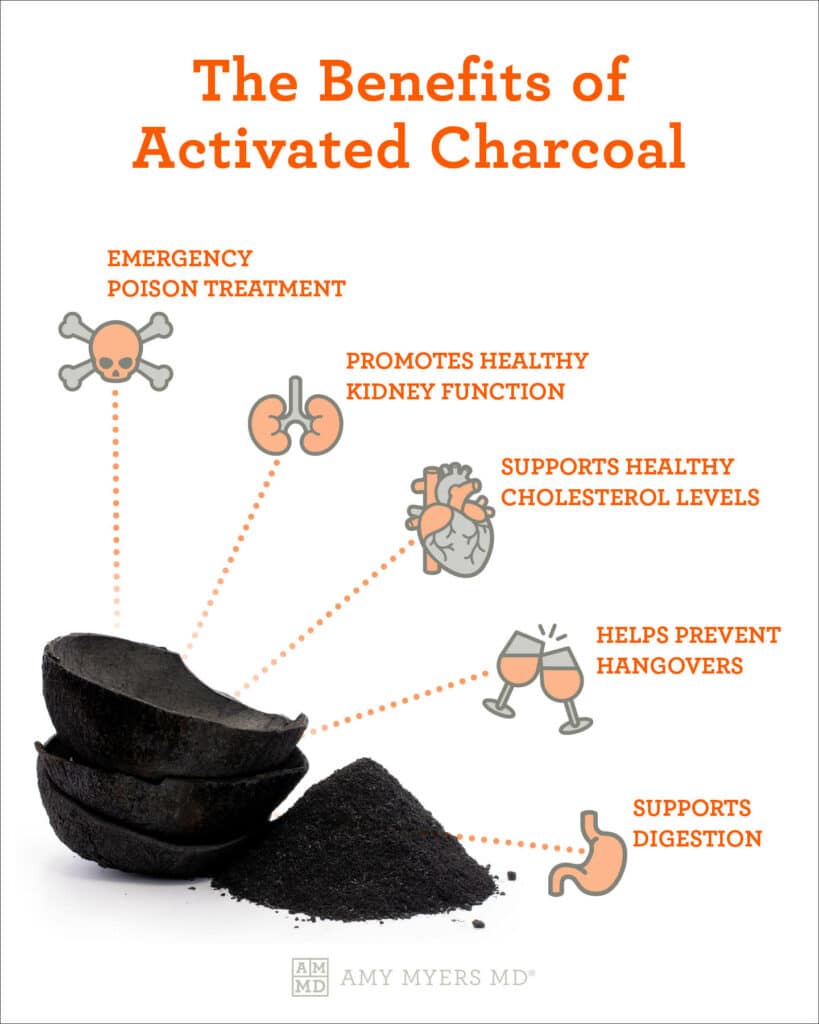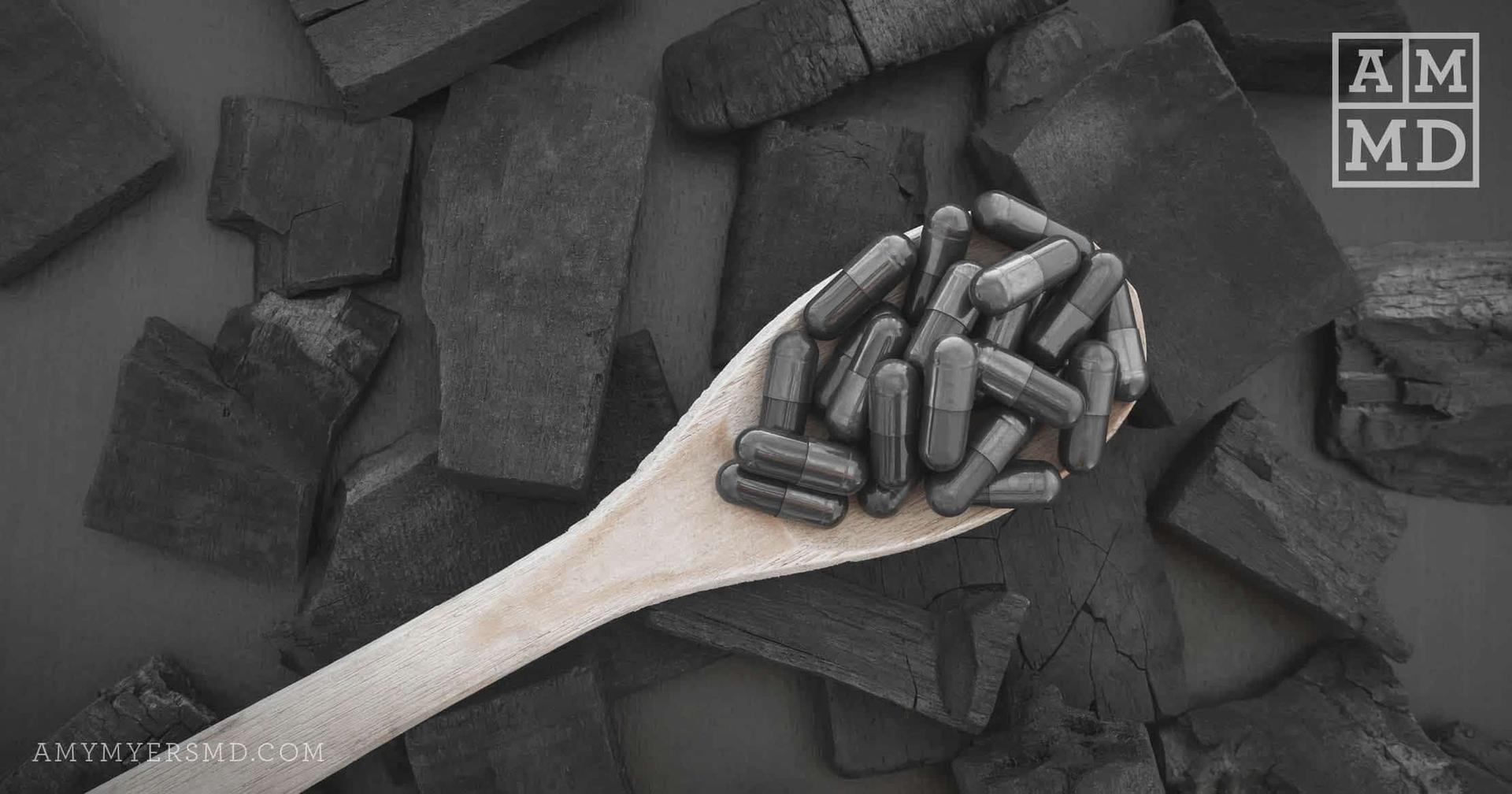So many products on the shelves claim to “detox” your body. If you look closely, you might notice that more products include activated charcoal, even in toothpaste, soaps, face scrubs, and other beauty products. The reason why charcoal is a popular ingredient in many products is that there are many benefits of activated charcoal. Yet, they all have one crucial thing in common – removing toxins.
Toxins are all around us. You are exposed to thousands of toxins every day, even if you don’t live in a polluted area or work in an industrial job. Toxins are in the air you breathe, the water you drink, the food you eat, and in your clothing, cosmetics, cleaning products, and cookware you use every day -and in fact, our government has approved them and said they are safe.
For optimal health, reducing our exposure to chemicals and toxins is vital. And in those moments of toxic exposure, you need a good “mop” to clean up the toxic aftermath. Enter activated charcoal. Let’s explore the benefits of activated charcoal, how it works and why it’s showing up in so many products. Before we get into that, let’s talk about activated charcoal and what makes it different from a briquette of charcoal.
What is Activated Charcoal?
When you think of charcoal, you probably picture charcoal briquettes on a grill, cooking burgers, hot dogs, and chicken. Believe it or not, it’s the same type of charcoal used in many of the products you’re seeing on the shelves. However, the charcoal you use for barbecuing hasn’t been activated at high temperatures and contains several toxic substances.
Activated charcoal is a black, odorless, and flavorless powder that has been treated with oxygen at high temperatures (about 1,700 degrees Fahrenheit) to make it more porous.1The maximum temperature of charcoal in a grill is only 1,200 degrees Fahrenheit.
Heating to such extreme temperatures changes the internal structure of the charcoal, reducing the size of its pores and increasing the surface area. This process results in the black powder we see in capsules, powder supplements, toothpaste, and beauty products. I’ll tell you why it’s being included when I talk about the benefits of activated charcoal.
Activated charcoal has been used in emergency rooms for decades as an emergency overdose treatment. It is also believed that activated charcoal helps reduce gas and flatulence, supports lower cholesterol levels, and facilitates kidney function. The benefits of activated charcoal also extend to working to filter your water and stopping hangovers. I’ll talk more about this in a second. First, let’s discuss how activated charcoal works.
How Activated Charcoal Works?
As I mentioned, charcoal becomes activated when treated with oxygen and then heated to extreme temperatures This chemical process changes its structure. Carbon is the main ingredient in charcoal. When you heat carbon, it either melts or combusts. Carbon combusts when heated in the presence of oxygen. This combustion expands the surface area of charcoal and makes it more porous, thus making it activated.
Once you have ingested activated charcoal, the toxins bind to it in your stomach and eliminate it through your stool. The large pores formed from the activation process allow the charcoal to work as a binder to collect toxins, gasses, and other unwanted substances in your body, thus reducing oxidative stress caused by free radical damage.2
Free Radicals and Oxidative Stress
Free radicals are essentially atoms missing an electron. Everything, including the cells in our bodies, is made up of atoms that contain a nucleus made up of protons and neutrons. That nucleus is surrounded by constantly moving electrons, typically attached to atoms in pairs.
Every atom needs an even amount of electrons to remain stable. When an atom has an odd number of electrons, it hunts for a spare electron throughout your body to replace the missing electron and become stable. The molecules missing an electron become free radicals that try to steal electrons from healthy cells and damage them.
Think of these damaged cells, or free radicals, as rusty particles traveling through your bloodstream and causing inflammation, also known as oxidative stress. When there are more free radicals than antioxidants, the free radicals can start doing damage to cells, proteins, and your DNA. This damage over a long period can lead to numerous diseases such as diabetes, high blood pressure, heart disease, Alzheimer’s disease, and cancer.3
Prevention is critical because once you have toxins in your body, you need to get them out. Your body is constantly working to excrete toxins on its own, and those with autoimmune diseases often have more difficulty detoxing than others. Don’t worry. I’m going to tell you about my No. 1 tool to detox your body in just a minute. Let’s discuss the benefits of activated charcoal.
Benefits of Activated Charcoal
The most popular use of activated charcoal is for accidental overdose treatment. However, you should not self-administer activated charcoal to treat poisoning or an overdose. Always seek medical assistance immediately if you suspect poisoning or an overdose. That said, here are the benefits of activated charcoal.
 Dr. Amy Myers
June 22nd, 2022
https://content.amymyersmd.com/article/activated-charcoal-benefits/Benefits of Activated Charcoal – infographic – Amy Myers MD®
Dr. Amy Myers
June 22nd, 2022
https://content.amymyersmd.com/article/activated-charcoal-benefits/Benefits of Activated Charcoal – infographic – Amy Myers MD®Emergency Poison Treatment
As a former emergency room physician, I gave activated charcoal to patients that had ingested poison or overdosed. As a matter of fact, activated charcoal has been used since the early 1800s as emergency treatment for poisoning because of its binding properties.4
Activated charcoal is most beneficial when taken within the first hour after an overdose or poisoning. Older studies suggest that taking it after this initial hour is unlikely to help. However, newer research reports several cases in which it was effective even when taken past this first hour. It may be because activated charcoal stops a drug from being absorbed and helps your body eliminate already absorbed drugs more quickly.5
One thing to note: It’s important to note that activated charcoal is ineffective in some cases of poisoning. Remember, always seek medical assistance if you suspect poisoning or an overdose so a medical professional can recommend the best course of treatment based on what was ingested and the amount.
Promotes Healthy Kidney Function
Your kidneys function as a filter for your blood just as your liver does. They help remove waste and toxins from your blood. Due to its binding properties, activated charcoal promotes kidney function by reducing the number of waste products your kidneys have to filter. Healthy kidneys are normally very well equipped to filter your blood. However, if you have kidney disease your kidneys have to work harder to remove toxins.6
Reduces Gas and Supports Digestion
Some studies show that activated charcoal can help with gas and digestion. However, the studies are mixed. One study found that a mix of charcoal and the gas-relieving medication Simethicone seems to help ease pain, gas, and bloating. Activated charcoal can also help to bind to potentially irritating proteins, such as casein, a protein found in cow’s dairy, and gluten, a protein in wheat, barley, and rye that gives bread its gooey structure. Gluten and dairy are inflammatory foods that I recommend everyone removes from their diet.
Hangover Prevention
One of the most popular uses for activated charcoal is hangover prevention. After all, alcohol is a toxin, and activated charcoal is a binder that absorbs toxins in your body. Yet, there’s a misconception about the benefits of activated charcoal and hangovers.
Activated charcoal absorbs toxins in the stomach. Only 20% of the alcohol you consume is absorbed in the stomach, and the remaining 80% is absorbed in your small intestine and sent into your bloodstream very quickly.7
Taking activated charcoal after a night out drinking won’t do much to remove the alcohol in your body; it may increase nausea and vomiting. Activated charcoal is more effective in preventing hangovers when taken before drinking.8 Of course, the best way to prevent a hangover is to avoid alcohol altogether.
Skin & Teeth
Activated charcoal is a star ingredient in facial cleansers, toothpaste, and other skin products. That’s because it not only traps and carries away dirt, makeup, and impurities yet also has powerful stain-removing properties. Activated charcoal provides a safer alternative to products with harsh, toxic chemicals. It’s a natural way to cleanse the face without drying out your skin and whiten your teeth when added to products in your dental hygiene regimen.
Now that you know the benefits of activated charcoal, I’m going to tell you about my go-to tool, sourced from all-natural coconut shells to encourage healthy detoxification pathways.
The Best Activated Charcoal
Activated Charcoal is an excellent idea if you’ve consumed food or drink you shouldn’t have! Whether you’ve eaten or drank something that expired a little too long ago or headed out for a night on the town, activated charcoal can help “mop up” the toxic aftermath and help you feel your best faster.
I sourced Coconut Charcoal from pure coconut shells for maximum surface area and absorbency. While many activated charcoal supplements on the market are made from undeclared types of wood and may not have the correct grain size for optimal detoxification, Coconut Charcoal is made entirely from coconut shells. It is grounded in an ultra-fine powder for optimal benefits.
Coconut Charcoal can bind to molds, mycotoxins, and even heavy metals. Because activated charcoal has a negative electric charge, it can attract and remove positively charged compounds/ These compounds include molds, mycotoxins, heavy metals, bacteria, and toxic metabolic byproducts of unwanted microbes and other organisms. This is especially important for those exposed to moldy buildings, poor-quality dental amalgams, and other environmental toxins.
Coconut Charcoal is best taken on an empty stomach when using it for detoxing. Any time of the day is generally acceptable. I usually have my patients start by taking it between breakfast and lunch with a full glass of water, then again between lunch and dinner.
A Word of Caution
Remember, activated charcoal is a binder. While it helps trap toxins, you must be careful when combining it with other medications or supplements. Do not take activated charcoal within an hour of another prescription, over-the-counter medicines like acetaminophen, or other supplements. Doing so could reduce the effectiveness of your medicine or supplement.
Reducing our exposure to chemicals and toxins is crucial for optimal health. The ugly truth is that avoiding toxins in our modern environment can be tricky. In those instances, Coconut Charcoal is perfect for anyone who needs support to “mop up” the toxic exposure.

Article Sources
- What Is Activated Charcoal? Benefits and Uses. Alina Petre, MS, RD. Healthine. 2021.
- The Truth About Activated Charcoal. Melinda Ratini, DO, MS. WebMD. 2021.
- Everything You Should Know About Oxidative Stress. Megan Dix, RN, BSN. Healthine. 2018.
- Activated charcoal for acute overdose: a reappraisal. David N Juurlink. Journal of Clinical Pharmacology. 2016.
- Systematic review on the use of activated charcoal for gastrointestinal decontamination following acute oral overdose. Lotte C G Hoegberg, et al. Clinical Toxicology. 2021.
- A nexus of progression of chronic kidney disease: charcoal, tryptophan and profibrotic cytokines. Gerald Schulman. Blood Purification vol 24. 2006.
- Alcohol and Your Body. Gerald Schulman. University of California Santa Cruz Student Health . 2021.
- I Learned What I Expected — Testing Trendy Activated Charcoal Remedies. Emily Gadd. Healthine. 2019.
